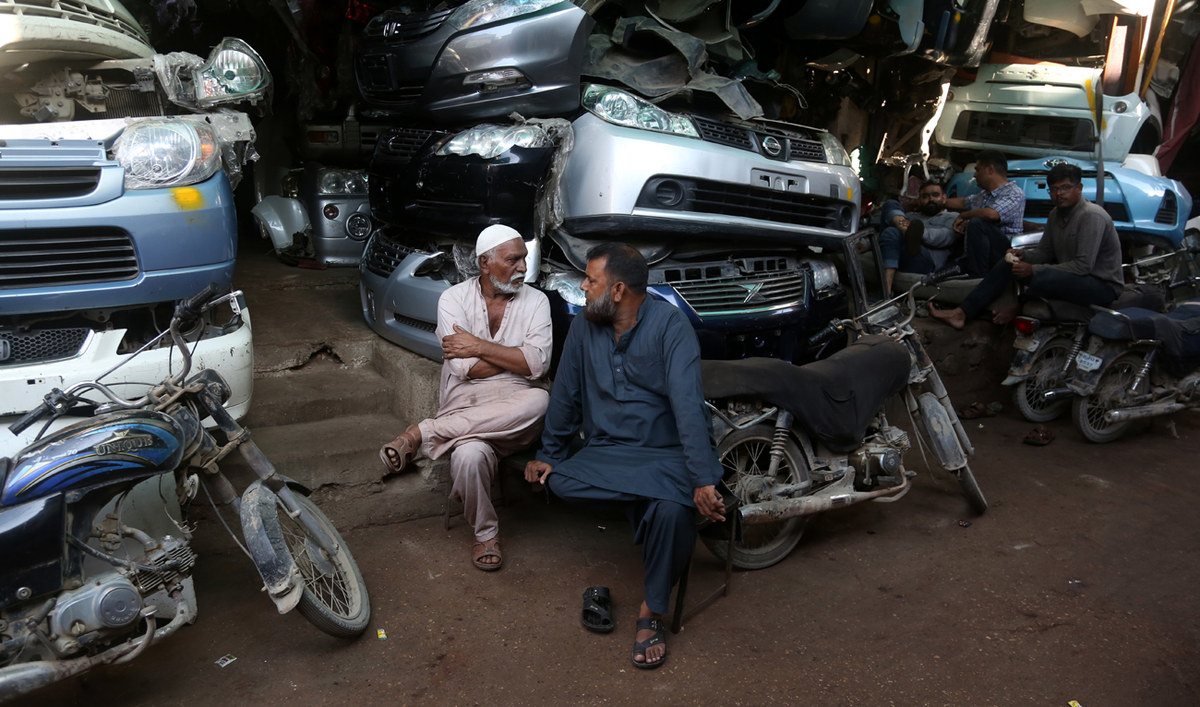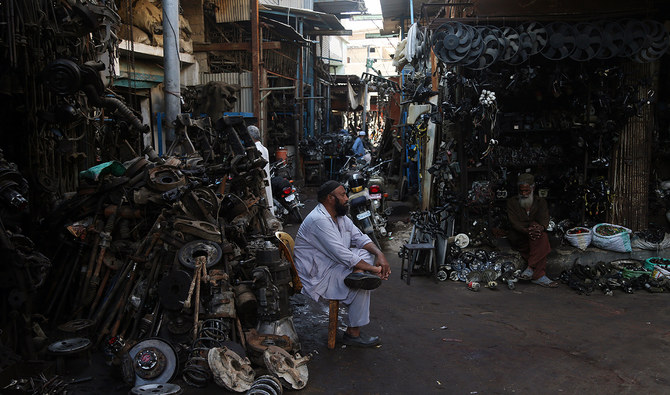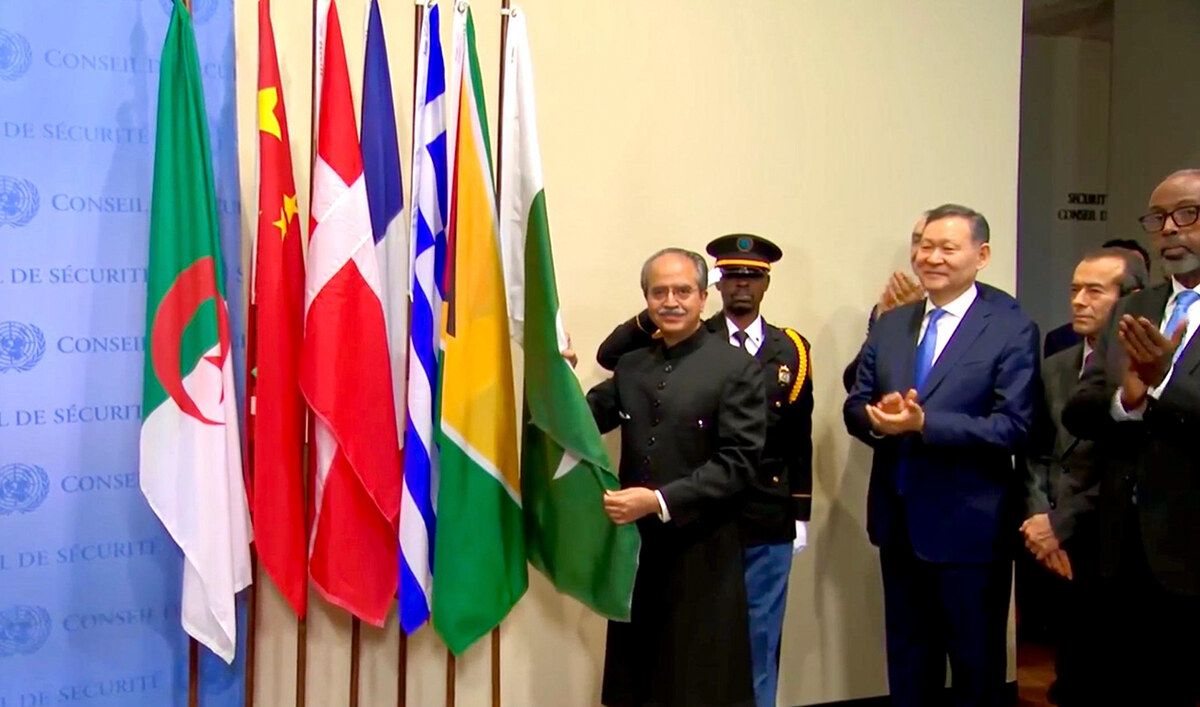KARACHI: Surrounded by the sharp odour of oil peculiar to auto and mechanical repair workshops, scrap dealers sit inside shops and warehouses at Karachi’s Sher Shah Kabari Bazar, waiting for customers.
When shoppers do turn up, they often leave without buying anything.
These are hard times for the largest scrap market in Pakistan where anything from a “needle to parts of an airplane” are up for grabs at thousands of shops and warehouses that cater to a country-wide demand for used parts.
But over the last few years, traders said, business at the market had seen a steady decline due to a slowing economy, a rising dollar-rupee disparity and official curbs on imports.
“The dollar-rupee disparity and other economic factors are hurting every sector but we are feeling the heat more than anyone else,” Abdul Khaliq Agha Jan, general secretary of the scrap market’s welfare association, told Arab News at the bazaar. “With substantial increase in the prices of goods, our business activities have been cut by half.”

Traders Inayat Ali and Muhammad Tariq wait for customers at their shop located in Karachi city's Sher Shah Bazaar, Pakistan's largest scrap market. Photo taken November 01, 2022 (AN Photo by S.A. Babar)
According to the Pakistan Bureau of Statistics, imports of iron and steel scrap, a mainstay of Sher Shah, declined by more than 43 percent in terms of quantity and 24 percent in terms of dollar value during the first quarter of the current fiscal year.
Pakistan’s economy is only expected to grow by two percent in the fiscal year ending June 2023, according to the World Bank, while inflation hit a historic high at 26.6 percent in October.
“The current economic conditions have substantially impacted business activities at Sher Shah market,” Jan said. “The inflow of imported scrap has almost stopped and prices have gone high.”

Two traders chat at the Sher Shah Bazar in Karachi, Pakistan, on November 01, 2022. This is the largest scrap market in Pakistan (AN Photo by S.A. Babar)
Located in the southern part of Karachi, Pakistan’s commercial hub, the scrap market set up in the 1960s provides major support to business activities in the adjoining Sindh Industrial & Trading Estate (SITE).
“This market was established in 1960, KMC [Karachi Metropolitan Corporation] built this place,” Jan said.
“There were a few hundred shops then, which have by the grace of god grown to number in the thousands now. The containers, which come from other countries, any rejected things, they are all sold in wholesale here.”
The market, which mostly imports goods from Dubai and Singapore to feed local industries, has a wide variety of products on display.
“Electric motor, penal, switchboard, auto parts, tires, I mean everything found in the world is available here, everything, as old as can be, can be found here,” Jan said.
“If you go to purchase new auto-parts, stuff like mudguards or lights, if it costs you Rs1,000, you can find it here for Rs500, so for around fifty percent [discount.]”
The imported cargo is initially stored in large warehouses before it is distributed to about 4,000 at Sher Shah Bazaar.
“This is Asia’s biggest spare parts market,” Malik Zahid Dehlvi, president of the market’s welfare association, told Arab News. “If you shut down the Sher Shah Scrap Market for only four days, I imagine the entire Pakistan will shut down.”
Dehlvi said mechanical goods imported from different parts of the world and available the bazaar played an important role in keeping the country’s industrial machinery running.
“It is here that big factories procure parts to keep their machines in motion,” said Dehlvi.
“When this area was inundated after the recent [monsoon] rains, we observed a protest strike and shut down the market for four days. They [factory owners] asked us to open the market because they were suffering losses.”

A heavy machine at the Sher Shah Bazar in Karachi, Pakistan, on November 01, 2022. This is the largest scrap market in Pakistan. (AN Photo by S.A. Babar)
Apart from dealing in mechanical components of every imaginable bearing and standard, Sher Shah Kabari market is also a one-stop shop for used auto parts, and something of a blessing for car-owners in Pakistan, a country among the leading markets for reconditioned cars in the region.
Though relatively cheaper than new cars, spare parts for reconditioned car are not easily available — which is where scrap markets like Sher Shah come in, keeping previously owned vehicles on the road.
According to traders, the market not only caters to local industry in Karachi but also auto part buyers in other parts of the country, who come looking everything including complete engines, imported from other countries where vehicle age restrictions are in place.
“People get genuine auto parts by paying less money here,” Hajji Muhammad Shahzad, the chairman of the All Pakistan Motor Dealers’ Association, told Arab News.
“Without this market there is no way one can maintain a re-conditioned car,” trader Tahir Saeed said. “You can keep the car but if it breaks down, you won’t be able to find the engine, body parts, not even the indicator light. If you import it from the company, it will be very expensive.”
But some Pakistani industrialists said while Sher Shah contributed to informal industries, its input in the organized sector was overrated.

Scrap items on display at the Sher Shah Bazar in Karachi, Pakistan, on November 01, 2022. This is the largest scrap market in Pakistan (AN Photo by S.A. Babar)
“The organized and serious industries, by and large, don’t purchase scrap for utilization,” Riaz Uddin, president of the SITE Association of Industry, told Arab News. “However, informal industries rely on Sher Shah for their mechanical needs.”
But most traders lamented the decline in sale in recent years.
“The dollar rate has gone up which has had an impact on sales. Few customers come and when they come, they go [without buying anything],” Jan said. “The dollar rate is increasing so fast that we buy something for Rs120 but have to sell for Rs100.”
He said the market was once a favorite spot for foreigners also.
“When the [security] situation was better, foreigners would also come because they would be interested in the kind of old stuff that is found here,” Jan added. “They would purchase as well as take it with them. But they don’t come as much now because of deteriorating law and order conditions.”

Refurbished engines on display at the Sher Shah Bazar in Karachi, Pakistan, on November 01, 2022. This is the largest scrap market in Pakistan (AN Photo by S.A. Babar)

Heavy compressors on display at the Sher Shah Bazar in Karachi, Pakistan, on November 01, 2022. This is the largest scrap market in Pakistan (AN Photo by S.A. Babar)


















